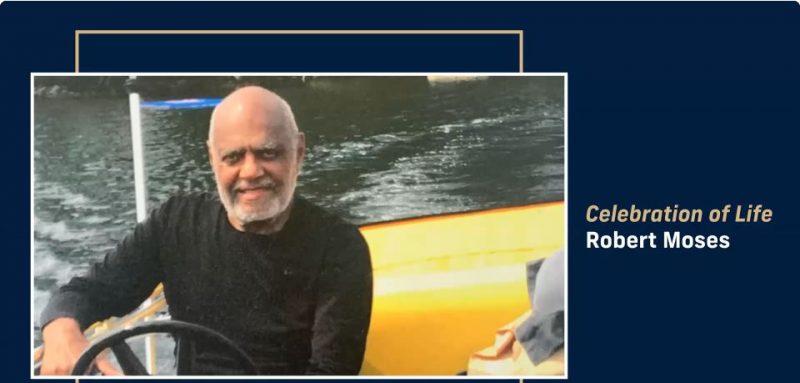
Click HERE to watch the Zoom tribute to Bob Moses hosted by Florida International University, with the participation of the Moses family. (There will be another homegoing ceremony in Cambridge in September.)
The presence of figures from FIU and Broward County’s public school system spoke to the Moses family’s will to keep on pushing the Algebra Project’s program in Southeast Florida. The AP has been integrated into FIU and Broward schools for over a decade and the Moses memorial became another occasion to strengthen institutional connections. (The AP/Broward County link is one more sign of Moses’s instinct to go where America Dilemmas are right in your face. The Broward County School Board is currently resisting Governor DeSantis’s threat to withhold salaries from administrators and teachers who enforce mask mandates.)
Bob Moses’s daughter, Maisha (who Zoomed in at 10:30), and his wife, Janet (who joined around 1:14:45), gave clear-eyed (if sometimes tearful) testimony, fusing kin-folk truths and the book of Curtis Mayfield with The Autobiography of a Yogi and musings of Movement elders. Informed by organizers’ imperatives, their tales of Moses’ life in struggle steered listeners out of doomy darkness. The way forward came into focus for me when another speaker, Whitney Brakefield, made the Moses family’s sense of what’s possible real. Ms. Brakefield instantiated an American future that might seem unimaginable, until you hear her. (She zoomed at 52:25.)
Ms. Brakefield was in Moses’ first Southern cohort of AP students and is currently a PhD candidate in data science and engineering at the University of Tennessee. She began with condolences and then quoted Moses (from back in his SNCC days)…
“When you’re in Mississippi the rest of America doesn’t seem real.
And when you’re in the rest of America, Mississippi doesn’t seem real.”
My name is Whitney Brakefield and I’m from Mississippi.
She didn’t need to hammer on the point. It was all there in her deep Southern drawl. Ms. Brakefield sounded like a natural woman–albeit one who will soon have a STEM PhD to complement her mastery of rhetoric. Her soulful, round-the-way womanism isn’t ghettocentric, but it’s still a thousand thought-miles away from the kind of class-bound “diversity” that defines student bodies in elite schools.
Ms. Brakefield seemed devastated by the loss of her second father, but, thanks to “Doc Moses” (and the AP), her pride in her own mind and Sisterliness will see her through. She personifies the Southern dream of equality that lifted SNCC in the Sixties. No doubt Ms. Brakefield will always be at home down home, but (as she underscored when she discussed “Doc’s pedagogy”) she contains multitudes as well as many thousands gone: “the approach that he took with us never limited us to the community in which we were raised.”
This is not a young woman who will have trouble finding the right relation between freedom and the need for roots. She’s already teaching by example, as her mentor always did. Maybe we won’t have to live in a post-Moses world if we keep up with his students. B.D.
First thanks Joannie Wynn — Moses family co-conspirator and coordinator of the FIU tribute — for facilitating access to the recording of the event.